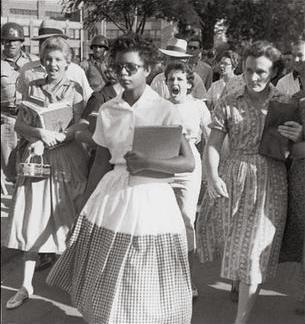The fight for civil rights in America is punctuated by a series of pivotal events, one of the most significant being the Little Rock Crisis that unfolded on September 4, 1957. This was the day when Arkansas Governor Orval Faubus made a bold move, using the National Guard to block nine Black students from entering Little Rock Central High School. His act of defiance against the U.S. Supreme Court’s desegregation ruling in Brown v. Board of Education would escalate into a national crisis and leave an indelible mark on the civil rights movement.

Fun Facts:
- Governor Orval Faubus ordered the Arkansas National Guard to block the nine Black students from entering Little Rock Central High School, directly challenging the Supreme Court’s decision in Brown v. Board of Education (1954), which mandated the desegregation of public schools.
- The nine African American students—Ernest Green, Elizabeth Eckford, Jefferson Thomas, Terrence Roberts, Carlotta Walls, Minnijean Brown, Gloria Ray, Thelma Mothershed, and Melba Pattillo—became symbols of the fight for civil rights. Their unwavering bravery in the face of intense opposition, determination to claim their right to education, and refusal to be intimidated were both instrumental and awe-inspiring in the struggle for racial equality.
- The confrontation not only captured the nation’s attention but also drew international focus, highlighting the fierce resistance to desegregation in the South. It exerted pressure on the federal government to uphold the rule of law and protect the rights of Black citizens, demonstrating the civil rights movement’s global impact.
- President Dwight D. Eisenhower eventually had to intervene by sending federal troops to escort the students into the school on September 25, 1957, ensuring their safe entry and enforcing the desegregation order.
- Impact on Civil Rights Movement: The Little Rock Crisis underscored the challenges of implementing desegregation in the United States and galvanized the civil rights movement, leading to increased activism and the eventual passage of the Civil Rights Act 1964.
- Legacy: The bravery of the Little Rock Nine continues to be revered as a significant moment in the fight for civil rights, symbolizing the battle against racial segregation and the ongoing quest for equality in education.

